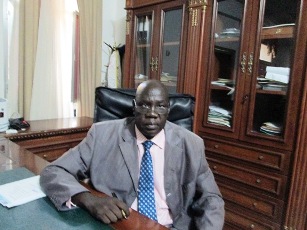Upper Nile to lose over 200 Sudanese teachers by end of year
By Julius N. Uma
December 12, 2012 (JUBA) – Between 200 and 300 Sudanese primary and secondary school teachers in South Sudan’s Upper Nile could lose their job by the end of this year, should the state’s education, science and technology ministry implement a recent decision from the state’s council of ministers.

South Sudan separated from Sudan last year as part of a landmark peace deal, ending decades of civil war. The decision, Sudan Tribune has learned, was contained in a strongly worded circular issued by the state government in September this year.
“We shall try our level best to fill the gap created, [but] I don’t think we shall be able to get between 200 and 300 teacher to replace those terminated,” said Minister Deng told Sudan Tribune on a visit to Juba.
While acknowledging the national government’s decision, Deng said his ministry remains determined to achieve its mandate, in line with the United Nations Millennium Development Goal (MDG) on universal access to education.
“Our goal is to ensure that all individuals in the state have access to primary school education regardless of age, special needs and gender discrimination,” he emphasized.
In September, South Sudan officially launched a nationwide campaign seeking to reduce by 50%, illiteracy rates among its adult population by 2015. The campaign is part of its much-hyped education for all programme. Less the 30% of South Sudan’s population are able to read and write.
With nearly 500 primary and secondary schools, Upper Nile’s education ministry is the state government’s largest department, comprising of seven directorates and six education centers.
This year, primary school enrollment increased to over 208,000 compared to nearly 187,000 in 2010, while the numbers of primary schools also increased to 420, from 362 in 2010, according to the ministry.
South Sudan suffered over two decades of a bloody civil war, which destroyed most of the regions’s minimal pre-existing infrastructures, including schools, tertiary and technical institutions.
The new nation, according to its 2009 Household Survey report, has one of the highest illiteracy rates in the world, with only 27 percent of those aged 15 and above are said to be literate.
Deng, however, said the education ministry is determined to develop the basic education sector, capital investment, alternative education system, gender equity and access for all, basic teacher education and professional development and capacity building of headsmen in educational institutions.
Upper Nile, he said, was simply implementing a decision taken by the
national government in Juba aimed at giving more opportunities to South Sudanese. The Sudanese teachers who will have to leave their jobs by the New Year have not asked to leave South Sudan.
The minister says he will advocate that all the staff receive their full pensions.
KEY FACTS ON EDUCATION IN UPPER NILE
- In 2012, primary school enrollment increased to 208, 347 compared to 186,939 in 2010
- The numbers of primary school building increased to 420 in 2012 compared to 362 that existed by the end of 2010
- In 2012, at least 136,993 boys enrolled in primary schools compared to 103,898 girls
- The Education ministry receives between 5-7% of the state budget, despite being the largest ministry in Upper Nile
- A grade 14 teacher in Upper Nile receives a monthly pay of SSP 280 ($70) while a Grade 9 (college graduate) gets SSP 792 ($180).
- South Sudan’s Education for All (EFA) Goal 4 is a 50% reduction in adult illiteracy by 2015, yet it remains one of the least funded.
(ST)
